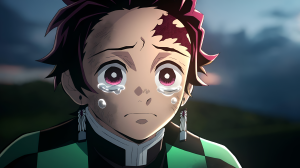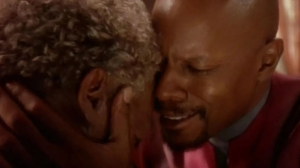Warning: This post contains Major Luke Cage season 2 Spoilers!
Videos by ComicBook.com
Marvel fans are coming to the end of Luke Cage season 2, and of all the big twists, reveals, and deaths, that are included in the sophomore season, the ending might be the biggest surprise of all!
After the death of Mariah Stokes (Alfre Woodard), Harlem becomes a gangland war zone. The Italians, Dominicans, Puerto Ricans, Koreans and Chinese all see black-controlled Harlem as up for grabs, and the violence pushes police and emergency responders to the brink. Not even Luke – with all his power – can plug the flood, at least not as the “Hero for Hire” he’s been representing himself as.
Ironically enough, it’s Mariah who gets into Luke’s head, in what might be her most nefarious plan yet. Before dying, Mariah is the one who floats the idea that Harlem needs a king to rule in her stead – and that idea is fostered by Shades (Theo Rossi), who comes to Pop’s Barbershop with a message that the quickest way for Luke to stop the flood of violence is to put his own superpowered hand over the faucet.
The combination of those prompts has Luke go out and visit the various crime families with a message: Harlem is now his, with a thick lock box around it. The gangs and syndicates are given room roam outside of Luke’s jurisdiction, creating a tenuous truce and balance in the uptown underworld. To cement the coronation, Mariah leaves Luke ownership and deed to Harlem’s Paradise, and although Luke seems to at first want to destroy the club, he ends up putting on a suit and running it in Mariah’s stead. The season ends with Luke taking on that new role as the big boss of Harlem, at the expense of alienating friends like Misty Knight, D.W. Griffiths, and even his lady love, Claire.
Why Luke Becomes a Crimeboss

The entire idea behind this transition is built into the fabric of season 2’s storyline – a slow burn exploration of negative emotion and how it can lead even well-meaning people down a dark path. It’s echoed in the storylines of Luke, Mariah, Shades, and Bushmaster – or even in the arcs of secondary characters like Comanche or various police characters featured in season 2.
For Mariah, this descent into darkness is purposeful: in one of her last voiceovers to lawyer Ben Donovan, Mariah reveals that she’s leaving her crown jewel (Harlem’s Paradise) to her hated enemy (Luke) precisely because she knows that it will twist and change him over time. For Luke, there is the (Naive? Arrogant?) belief that he and his power are uniquely qualified to save Harlem, and that trying to fit the molds other people keep carving for him is not the right way. It’s that exact outlook that has D.W. give Luke a new nickname before kicking him out of Pop’s Barbershop for good: Luke Trump.
As for why this was the chosen ending for the season, showrunner Cheo Hodari Coker explains to THR:
“We wanted to fuck with people’s heads… I wanted at the very end of the season for people to really know this guy. I want them to think, ‘Let me go all the way back to episode one and watch all 26 again.’ We wanted a kind of twist that would make people do that.”
Luke Cage season 2 is now streaming on Netflix. Iron Fist season 2 will follow it at a date TBA; The Punisher season 2 is also in production.








